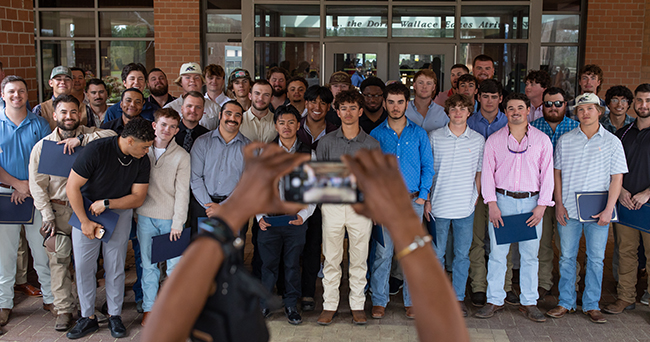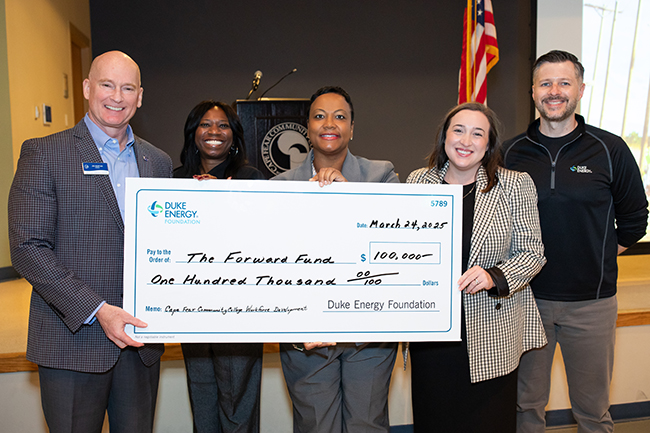A Rising Tide Lifts All Boats
02 May 2025
The Forward Fund works to bridge the wage gap through career training and financial support
By Vera Wilson » Photos by Madeline Gray

A living wage proves elusive for many in the Cape Fear region where too many are in low-paying jobs, which means that covering everyday expenses—especially housing, which has skyrocketed in recent years—can prove challenging. A local nonprofit, the Cape Fear Collective (CFC), is working hard to provide affordable places to live but found that even when offering below-market-price housing alternatives, too often the wages just weren't there to support it.
But what if a person could obtain higher-paying work so that housing, food, transportation, and other costs of living would be within their means? CFC, with Meagan Dennison at the helm as CEO at the time, decided it was time to tackle this problem of low and stagnant regional wages head-on. Aware that there were folks in the community who wanted to progress in their careers but didn't have the finances to do it, they wanted to focus on how they could lower the financial barriers to advanced training.
In the summer of 2023, they looked around the country to see if anyone else was addressing this issue and found pilot programs in New Jersey, Colorado, and Miami. "We were doing a lot of work in affordable housing which led us full circle back to workforce development, and how do we increase wages," explains Dennison. "We decided why not see what's possible here, so in November of 2023, we actually spun out this work to form The Forward Fund."

Dennison was quickly appointed CEO of the new organization. She was well-suited for the job, having started work as the CFC's first program director in 2019. In that position, she not only headed up programs but liaised with high-level regional stakeholders. Appointed CFC's CEO in 2022, she worked on various initiatives such as the Healthy Opportunities Pilot program, which aims to improve health and reduce healthcare costs by providing non-medical interventions, before moving on to lead The Forward Fund (TFF).
TFF soon discovered there was a shortage of workers in critical fields like healthcare and skilled trades, although educational opportunities to prepare for these higher-paying jobs were locally available. However, many training programs are full-time, even if they only last a few weeks. Balancing school and work simultaneously can be unrealistic but so is quitting your job or paying for childcare while attending school.
TFF determined the best way to encourage enrollment and ensure the student's success is to not only offer funding for tuition and school supplies but for living expenses as well, which allows the student to concentrate on learning rather than worry about paying the bills. The funds are not a gift, but a zero percent-interest loan. After graduation, they have a three-month grace period before starting to pay back the loan with manageable monthly payments and only if certain salary criteria are met.

Dennison describes 2024 as a year of "getting their footing with fundraising and getting the organization under us." In 2025, they started financing two programs offered at Cape Fear Community College — electric line workers and CDL truck driving.
"Of the 53 electric line workers that graduated [in March 2025] from Cape Fear Community College, we financed 10 to 12 of those individuals. The average loan size was around $8,000, but the starting salaries for these jobs are between $50,000 and $55,000. That's substantial upward mobility," says Dennison.
The next steps are to fund programs at other schools, like Fayetteville Technical Community College, as well as expand their program offerings. "On our horizon, we're looking at licensed skilled trades, anything from HVAC and plumbing to welding — those short-term programs are really good fits," says Dennison. "And you can imagine the healthcare demands, so everything from a licensed practical nurse to an associate's degree in nursing."
"We'd also like to get into technology fields, like software development or data analytics," she continues, "but we're essentially pretty agnostic about what we'll finance as long as there's high employer demand, it's a cost-effective program, and short-term in nature."
They've received generous donations and grants from individuals and businesses like Live Oak Bank, MegaCorp, and Duke Energy, as well as a three-million-dollar grant from the New Hanover Community Endowment. Although they currently have only 28 active loans, they believe they can finance over 1,000 students each year since the money awarded is recycled back into the program when loans are repaid.
"For us, our theory of change is that high-wage employment is 'the rising tide that lifts all boats,'" says Dennison. "Our goal is to change the system — be a financial alternative certainly to private predatory loans but also for students who pay high-interest loans. Simply put, we're just trying to help people make more money."
To find out more about The Forward Fund, visit their website at theforward.fund.














